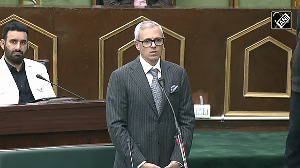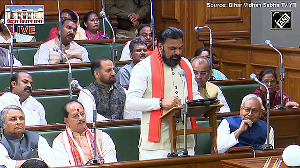Taxpayers with old, outstanding taxes will benefit from the CBDT's new scheme.

The Central Board of Direct Taxes has come out with an order stating it will waive small income tax demands with a ceiling of Rs 1 lakh per taxpayer across assessment years.
Taxpayers with old, outstanding taxes will benefit from the scheme.
"The CBDT's decision to drop minor tax demands and shift its focus to larger taxpayers and increased tax collection is a very good move.
"The fact that it will benefit more than 1 crore taxpayers is the icing on the cake," says S R Patnaik, partner (head, taxation), Cyril Amarchand Mangaldas.
The background
At the start of this financial year (FY24), the tax department had issued notices for outstanding demands. These demands, although small in amount, impacted many taxpayers, notably senior citizens.
The age of these demands posed a challenge because the necessary records and evidence for resolving them had been lost over time.
Finance Minister Nirmala Sitharaman announced in the Interim Budget that small outstanding direct tax demands of Rs 25,000 or less would be waived up to FY10, and Rs 10,000 or less for FY11 to FY15.
The details
After the FM's announcement, the CBDT has now issued the order pertaining to the waiver, detailing how demands for various assessment years are to be extinguished.
"It prescribes the maximum ceiling limit of waiver an assessee will be eligible for. Note that the board has prescribed that demands outstanding on January 31, 2024, shall be eligible for the waiver," says Alay Razvi, partner, Accord Juris LLP.
The waiver is capped at Rs 1 lakh per assessee, regardless of the total amount across assessment years.
Accordingly, the amount waived will be Rs 25,000 for assessment year 2010–11 and Rs 10,000 for assessment years 2011–12 to 2015–16, subject to the overall limit of Rs 1 lakh.

What about interest?
The notification suggests that the aggregate tax demands (including interest) of up to Rs 1 lakh shall be extinguished.
"No further interest needs to be calculated while doing this extinguishment," says Patnaik.
According to the CBDT order, the demand for interest levied on account of a delay in payment of the demand under Section 220(2) of the Income-Tax (I-T) Act would not be demanded post-waiver of the demand.
Kishore Kunal, advocate, KK & Co Chambers, says, "The order is applicable on the demands of principal, interest, any penalty, fee, cess or surcharge under the Act."
There is no waiver for demands raised against the deductor of tax deducted at source (TDS) or against the collector of tax collected at source (TCS).
Says Razvi, "No audit is required for remission of outstanding demand. This order is expected to be implemented within two months of its issuance. Assessments remitted or waived do not qualify for credit or refunds."
Things to keep in mind
It is advisable for taxpayers to check the status of their demands on the I-T portal.
"In order to ensure adherence to regulations, the taxpayer may adopt a proactive stance by accessing the I-T portal to track the status of outstanding demands," says Adithya Reddy, international tax lawyer.
Taxpayers do not, however, need to take any action to get their demands extinguished. The Centralised Processing Centre will itself determine the eligible demands and extinguish them.
The demand will clearly state that payment is not required.
Ankit Jain, partner, Ved Jain & Associates, says, "If you find a demand that should have been extinguished but was not, you can raise a grievance with the CPC by providing the details of the demand.
"It's best to wait until April to do this as the government has given the CPC a two-month deadline to cancel the demands."
In some cases, the demands for the eligible years may have been adjusted against refunds. There is no relief for such demands as they have already been paid and were not outstanding on January 31, 2024.
The waiver of demands will also not affect ongoing or completed criminal proceedings against the assessee.
Disclaimer: This article is meant for information purposes only. This article and information do not constitute a distribution, an endorsement, an investment advice, an offer to buy or sell or the solicitation of an offer to buy or sell any securities/schemes or any other financial products/investment products mentioned in this article to influence the opinion or behaviour of the investors/recipients.
Any use of the information/any investment and investment related decisions of the investors/recipients are at their sole discretion and risk. Any advice herein is made on a general basis and does not take into account the specific investment objectives of the specific person or group of persons. Opinions expressed herein are subject to change without notice.
Feature Presentation: Ashish Narsale/Rediff.com












 © 2025
© 2025